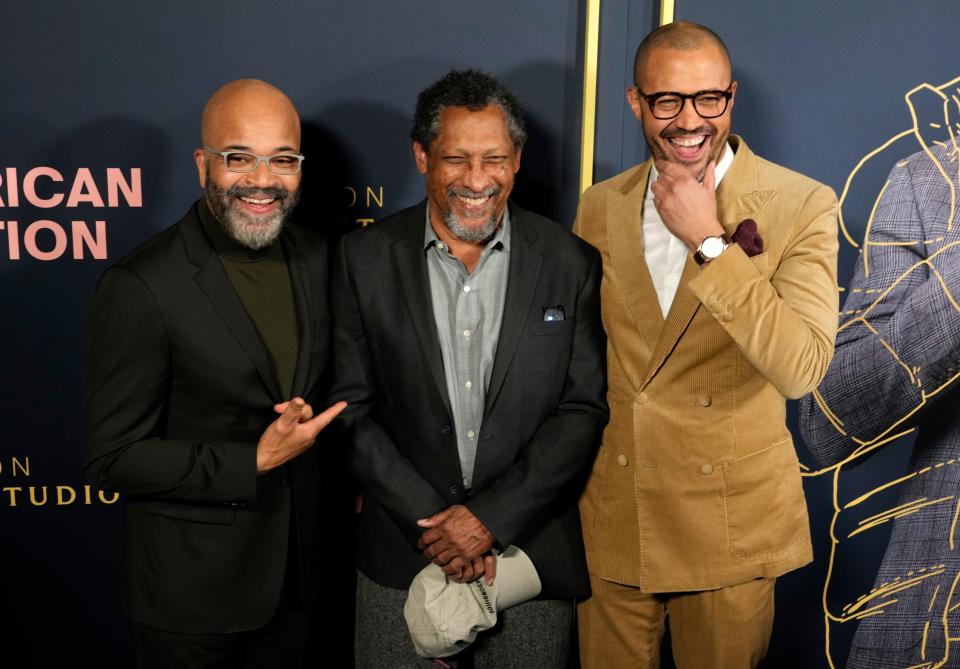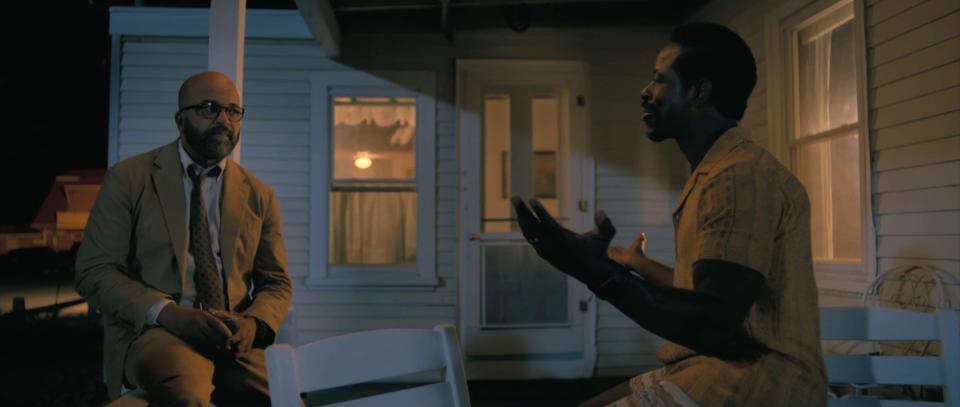With 'American Fiction,' Jeffrey Wright aims to 'electrify' conversation on race, identity
Jeffrey Wright is earning awards-season kudos for his grumpy role in the acclaimed satire “American Fiction,” playing what he lovingly calls an “equal-opportunity misanthrope.” Even his kids are doling out positive reviews.
“My daughter saw the movie and said, ‘There's a lot of your humor in there.’ I'm afraid to say it kind of came natural,” says Wright, 58, with a laugh.
Writer/director Cord Jefferson’s heartfelt and hilarious look at race, culture and identity centers on middle-aged academic Thelonious “Monk” Ellison (Wright), who spitefully writes a novel filled with Black stereotypes as a joke and, much to his chagrin, it becomes his biggest career success. At the same time, Monk reconnects with estranged family members, including his doctor sister Lisa (Tracee Ellis Ross) and gay brother Cliff (Sterling K. Brown), when mom Agnes (Leslie Uggams) begins to struggle with dementia.

In addition to a lead actor Golden Globe nomination for Wright, “American Fiction” (in select theaters now, nationwide Jan. 12) is also up for best comedy at Sunday’s ceremony. Those nods (and the potential for a best-picture Oscar nomination) follow a string of audience prizes during last fall’s film festival season and being named one of 2023’s top 10 films by the American Film Institute.
“I didn't want it to feel like an art-house thing that was only for a specific segment of people,” says Jefferson, who makes his directorial debut after a stint as a TV writer (“Watchmen,” “The Good Place”). “I wanted it to be a crowd-pleaser.”
'American Fiction' review: Provocative satire unleashes a deliciously wry Jeffrey Wright
Jeffrey Wright wants 'American Fiction' to 'electrify' race conversation

The film is an adaptation of Percival Everett’s 2001 novel “Erasure,” which came on Jefferson’s radar in 2020 at “a very, very low point.” A streaming drama he was working on about his time at the website Gawker was scrapped, and he had experienced the “limited perspective” of what people thought Black writers could do in journalism as well as in film and TV. “American Fiction” became his answer to this reductive view of Black stories in Hollywood, which often have civil rights or slave narratives and tales of trauma at the center.
“Especially in a country where we have people actively trying to ban books and rewrite history when it comes to racism and slavery, those movies are important,” Jefferson says. “My only contention has always been, why are we making these movies to the exclusion of almost everything else?”
Wright was drawn to its social commentary right from the first scene, where Monk riles up his mostly white literature students with a racial slur on the class whiteboard.
“We don't talk about race and identity and all of that stuff well in America,” the actor says. “We're afraid of it. We shy away from it. We get angry or we're traumatized by it. And at the end of the day, we haven't solved anything because we can't have productive conversations about it. So, I was pleased to find this film was an opportunity to maybe elevate the dialogue or at least electrify the conversation in a way that might be useful.”
What was the best movie of 2023? From 'Barbie' to 'American Fiction,' these are our top 10
Family ties bind Cord Jefferson's ‘American Fiction’ narrative

As much as Wright appreciates the movie’s even-handed criticism (“The film throws darts at everyone, including its lead”), the heart and soul of it is the “almost simple universality” of the Ellison clan. “It's a family that's at times insane, loving, maddening and, despite itself, together, and that sounds kind of like anyone's family,” Wright says. “It just happens to be populated by Black folks.”
Jefferson pulled from his own life for the script: Like Monk, he has two siblings with whom he has a “push-and-pull relationship,” and depending on the day, he might feel a little more Monk or Cliff. “Both these guys (are) going through a lot of pain and agony and fear that if they're honest and open, people aren't going to like what they see," Jefferson says. "There's a lot of me in those specific characters.”

Cliff hid his homosexuality from his late father, and Jefferson empathized with that decision: He would lie about smoking cigarettes to his mom, and she didn’t know his body was covered in tattoos until six months before she died of cancer in 2016. “I really felt awful that she didn't fully know who I was and she never was going to now,” Jefferson says.
Wright’s mother also died of cancer, a year before he read Jefferson’s script. Monk's predicament amid an unraveling family resonated with the actor, who had been a caretaker for his mom and now is for his 94-year-old aunt.
“I understood the pressures that brings upon a person and the sacrifices both personal and professional. It plucks some close strings for me,” Wright says. “When my son saw the movie a couple of weeks ago, he said, ‘I really identified with a lot of the challenges that Monk's facing in terms of the world's perception of him.’
"And then he said, ’It's also a beautiful homage to Grandma.’ I said to him, ‘You got it, man.’ ”
This article originally appeared on USA TODAY: 'American Fiction' is a satirical crowd-pleaser. Is an Oscar nod next?
